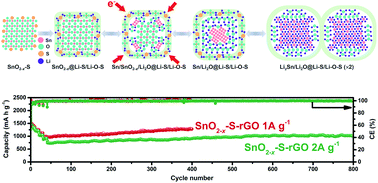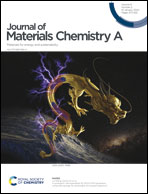Sulfur-terminated tin oxides for durable, highly reversible storage of large-capacity lithium†
Abstract
Convertible reactant anodes such as SnO2, GeO2, In2O3, and ZnO offer unusually large capacity for lithium ion batteries (LIBs) but all suffer from a huge volume expansion which triggers internal fracture and reconfiguration. Herein, sulfur-termination as a shifting paradigm to relieve volume expansion is proposed. The sulfur-termination strategy is expected to set each metal nanocrystal into a conducting container during the reduction process and plenty of containers are physically separated from each other but are electrically wired to the current collector. To put the strategy into practice, sulfur-terminated tin oxide (SnO2−x-S) nanocrystals as reactants are demonstrated to resist coarsening and reconfiguration throughout cycling. Such LIB anodes with the addition of a conductive supporter provide 1010 mA h g−1 at 2 A g−1 after 800 cycles, breaking new ground on multiple fronts for this promising anode class.

- This article is part of the themed collection: Journal of Materials Chemistry A HOT Papers


 Please wait while we load your content...
Please wait while we load your content...